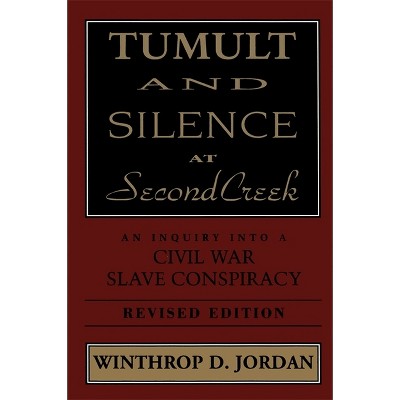Sponsored

Battle of the Wilderness, May 5--6, 1864 - (Jules and Frances Landry Award) by Gordon C Rhea (Hardcover)
In Stock
Sponsored
About this item
Highlights
- Fought in a tangled forest fringing the south bank of the Rapidan River, the Battle of the Wilderness marked the initial engagement in the climactic months of the Civil War in Virginia, and the first encounter between Ulysses S. Grant and Robert E. Lee.
- About the Author: Gordon C. Rhea is also the author of Carrying the Flag: The Story of Private Charles Whilden, the Confederacy's Most Unlikely Hero; The Battles for Spotsylvania Court House and the Road to Yellow Tavern, May 7--12, 1864; To the North Anna River: Grant and Lee, May 13--25, 1864, winner of the Fletcher Pratt Literary Award; and Cold Harbor: Grant and Lee, May 26--June 3, 1864, winner of the Austin Civil War Round Table's Laney Prize; and In the Footsteps of Grant and Lee: The Wilderness through Cold Harbor.
- 532 Pages
- History, United States
- Series Name: Jules and Frances Landry Award
Description
Book Synopsis
Fought in a tangled forest fringing the south bank of the Rapidan River, the Battle of the Wilderness marked the initial engagement in the climactic months of the Civil War in Virginia, and the first encounter between Ulysses S. Grant and Robert E. Lee. In an exciting narrative, Gordon C. Rhea provides the consummate recounting of that conflict of May 5 and 6, 1864, which ended with high casualties on both sides but no clear victor. With its balanced analysis of events and people, command structures and strategies, The Battle of the Wilderness is operational history as it should be written.
From the Back Cover
Fought in a tangled forest fringing the south bank of the Rapidan River, the Battle of the Wilderness marked the initial engagement in the climactic months of the Civil War in Virginia, and the first encounter between Ulysses S. Grant and Robert E. Lee. Gordon C. Rhea, in his exhaustive study The Battle of the Wilderness, provides the consummate recounting of that conflict of May 5 and 6, 1864, which ended with high casualties on both sides but no clear victor. Whereas previous studies have stood solely on published documents - mainly the Official Records and regimental histories - The Battle of the Wilderness not only takes a fresh look at those sources but also examines an extensive body of unpublished material, much of which has never before been brought to bear on the subject. These diaries, memoirs, letters, and reports shed new light on several aspects of the campaign, compelling Rhea to offer a critical new perspective on the overall development of the battle. For example, it has long been thought that Lee through his superior skill as general lured Grant into the Wilderness. But as Rhea makes clear, although Lee indeed hoped that Grant would become ensnarled in the Wilderness, he failed to take the steps necessary to delay Grant's progress and even left his own army in a position of peril. It was only because of miscalculations by the Federal high command that Grant stopped in the Wilderness rather than continuing on to a location more favorable to the Union forces. Throughout The Battle of the Wilderness Rhea gives close attention to the hierarchy of each army. On the Confederate side, he scrutinizes the evolving relationship between Lee and his corps commanders. On the Federalside, he reviews the several tiers of command, including the tense alliance between Grant and George G. Meade, head of the Union Army of the Potomac. Rhea presents a balanced analysis of events and people, command structures and strategies, while gracefully infusing excitement and immediacy into a subject for which he obviously feels great enthusiasm. Both the general reader and the specialist will find this important contribution to Civil War scholarship rewarding.Review Quotes
Rhea, a Virginia attorney, offers what will likely become the definitive account of one of the Civil War's most confusing engagements: the Battle of the Wilderness, the first encounter between Ulysses S. Grant and Robert E. Lee, fought in Virginia. The author's reconstruction of the fighting highlights the difficulties of controlling troops once they had been committed to action. Grant's original plan was to maneuver Lee out of his defensive position along the Rapidan River, then crush his troops with superior numbers. Instead, Rhea notes, the Wilderness became a "soldiers' battle," with raw courage compensating for inadequate generalship on both sides. Grant relied too heavily on the Army of the Potomac's commander, George Gordon Meade, who failed to coordinate the movements of subordinates disoriented by the broken ground they fought over. Rhea also criticizes Lee for consistently taking the offensive with an army that could not afford the major losses it sustained in attacking. History Book Club main selection.-- "Publishers Weekly"
Fought in a dense woods, the Battle of the Wilderness was the first clash between Grant and Lee. Two days of close-quarters fighting ignited the woods and trebled the casualty list with no advantage to either side; Lee stalemated Grant's superior force. Historian Rhea's revisionist history considers the Wilderness a Union victory. The author questions Lee's reputation as a brilliant strategist while praising Grant for a well-conceived battle plan. Personalities aside, the battle of attrition that would win the war had begun. Powerfully written, mingling official histories with diaries and letters, this study is filled with dramatic tension. As written by Rhea, the Battle of the Wilderness underscores how the Confederacy won many battles but lost the war. Strongly recommended for academic and public collections.-- "Library Journal"
In a meticulous, exhaustive, yet highly readable account, Thomas has done for the Battle of the Wilderness what others have done for Gettysburg, Antietam, and other Civil War battles. Rhea, an attorney and Civil War buff, gives clear historical treatment to one of the major engagements of the Civil War, the first important battle directed by Ulysses S. Grant after his appointment as general-in-chief of the Federal army. In the tangled, thicketed Virginia forest region south of the Rapidan River, Grant's force of approximately 120,000 was opposed by 65,000 men under the command of Robert E. Lee. The Union push was to be the beginning of Grant's campaign to capture Richmond, the Confederate capital. Though his army outnumbered Lee's by almost two to one, Grant met with stiff resistance, and the dense woods made fighting almost impossible. In the end, after both sides suffered heavy casualties, the battle was indecisive. Rhea views the engagement in the context of the increasingly desperate Southern situation in mid-1864 as resources became ever more scarce. He also relates the story of an important, little-known precursor to the battle: a disastrous foray by Federal troops against entrenched Confederates at Morton's Ford on the Rapidan in February of the same year. His narrative brings to life not only Grant, Lee, and James Longstreet, but also lesser known figures like ``Brains'' Halleck (Grant's predecessor as commander) and Gen. John Sedgwick (who commanded the 8th Pennsylvania Cavalry in the Wilderness and had previously, against his better judgment, commanded the attack at Morton's Ford). An extremely helpful appendix contains the complete order of battle for both sides. All future accounts of the battle will be measured against this work. Scholars and buffs alike will find the volume enthralling. (History Book Club main selection)-- "Kirkus Reviews"
This is the latest entry in the new category of regiment-by-regiment accountings of major Civil War battles, products made possible not just by revived interest in the conflict but by the rise of a new generation of Civil War historians able to research with the aid of computer databases. It's a well-written, absorbing, though decidedly bloody tally of the opening battle of the 1864 campaign in Virginia. The Confederate Army of Northern Virginia extricated itself several times from the jaws of disaster, while the Union Army of the Potomac slogged to a tactical draw that was turned into a strategic victory by Grant's refusal to retreat. As portrayed in these pages, the battle reflects much credit on the soldiers and somewhat less on most of the generals but certainly deserves the full coverage this massive volume affords. This main selection of the History Book Club is indeed a valuable addition to Civil War collections.--Roland Green "Booklist"
About the Author
Gordon C. Rhea is also the author of Carrying the Flag: The Story of Private Charles Whilden, the Confederacy's Most Unlikely Hero; The Battles for Spotsylvania Court House and the Road to Yellow Tavern, May 7--12, 1864; To the North Anna River: Grant and Lee, May 13--25, 1864, winner of the Fletcher Pratt Literary Award; and Cold Harbor: Grant and Lee, May 26--June 3, 1864, winner of the Austin Civil War Round Table's Laney Prize; and In the Footsteps of Grant and Lee: The Wilderness through Cold Harbor. He lives in Mt. Pleasant, South Carolina.
Shipping details
Return details
Frequently bought together


Trending Non-Fiction















